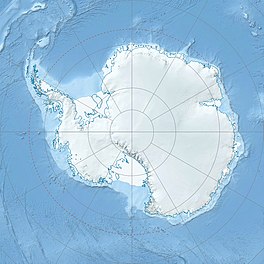|
Strom Glacier
Strom Glacier (85°10′S 164°30′W / 85.167°S 164.500°W) is a steep valley glacier flowing northeast from the north side of Mount Fridtjof Nansen to the head of the Ross Ice Shelf, flanked on the northwest by the Duncan Mountains and on the southeast by the Herbert Range.[1] NameThe glacier derives its name from "Strom Camp" near its foot, occupied during December 1929 by the Byrd Antarctic Expedition geological party under Gould. Strom Camp was named by that party for Sverre Strom, first mate of the ship City of New York, who remained ashore as a member of the winter party and headed the snowmobile party which hauled supplies in support of the two field parties.[1] RouteThe Strom Glacier forms to the north of the Herbert Range. Webster Knob is above its head, at the end of Barracouta Ridge. It flows northeast past the Duncan Mountains to its north.[2] The Cohen Glacier enters the Strom Glacier from its right. The Strom Glacier passes LaForrest Rock to its west before entering the Ross Ice Shelf to the northwest of the Axel Heiberg Glacier.[3] Features  Webster Knob85°18′S 166°30′W / 85.300°S 166.500°W. A prominent rock knob at the head of Strom Glacier. It stands near the extremity of a spur which descends from the northeast shoulder of Mount Fridtjof Nansen. Discovered and visited in November 1929 by the Byrd Antarctic Expedition geological party under Laurence Gould. Named by Byrd for Mrs. Laurence J. Webster, a contributor to the expedition.[4] Cohen Glacier85°12′S 164°15′W / 85.200°S 164.250°W. A small glacier draining northward from Mount Cohen of the Herbert Range to enter Strom Glacier near the head of Ross Ice Shelf. Named by the Southern Party of the New Zealand Geological Survey Antarctic Expedition, 1963-64, in association with Mount Cohen.[5] References
Sources
|
||||||||||||
